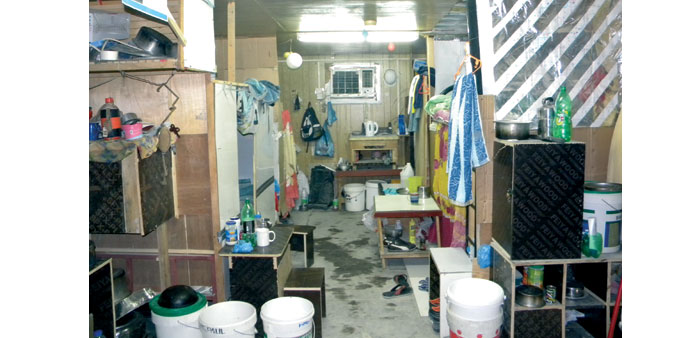A portacabin at a labour camp in Al Khor houses at least 14-16 workers. PICTURE: Joey Aguilar
By Joey Aguilar/Staff Reporter
After working as a labourer at a construction firm in Al Khor for barely five months, Eddie now wants to resign and go back to his country.
Like other workers who arrived in Qatar a few months ago, he feels the monthly salary he receives is not enough to sustain the needs of his family.
“Our basic pay is only QR800 and the QR200 food allowance is not enough for one month,” said Eddie from the Philippines, who stays with 13 other workers in a portacabin that has double-deck beds. About 150 labourers from India, Pakistan, Nepal and the Philippines live in the same labour camp.
From the QR800 basic, the workers send about QR450-500 to their families back home while the remaining money is spent on phone cards, transportation and Internet fees.
Asked about their concerns, Eddie stresses that salary remains the biggest issue for workers besides their poor living conditions in the camp. Citing the high cost of living in both Qatar and the Philippines, Eddie says he has to cope with the expenses and feed his four children who are all in school. One of them is set to finish high school next year and wants to study in college.
He said he could probably bear the conditions in the camp if he was getting a better salary - basically the main reason why most expatriates left their family and worked in a foreign land like Qatar.
However, without any reasonable increment after a year, he believed going back home would be his only option.
“We have no choice but to finish our contract first. But we really want to go home and see our children, our family,” said Eddie. “I realise it is better to eat dried fish and egg with your wife and kids.”
Almost everyone in the camp wakes up as early as 3am to cook and prepare food for breakfast and lunch. No canteen or cafeteria is open at the construction site, especially during Ramadan. The workers also have to cope with sweltering conditions while travelling in buses that have no air-conditioner.
After 10 hours of work, the workers have to wash their uniforms by themselves as there are no washing machines in the camp, which also does not have any recreational facilities for them. Eddie’s group and some expatriate workers have built improvised barbells and dumbbells, which they use for their exercise every afternoon.
The Filipinos have built a small basketball court out of some wooden scraps and metals. They play at least once or two times a week just to kill their boredom.
Meanwhile, a volleyball court has been set up for Indians and Nepalese who seem to play the sport well. Other nationalities can be seen playing football in an open field near the camp.
“We have our own sports and games here to avoid any confrontation,” said Eddie, who disclosed that a quarrel between two expatriate groups had turned into a violent clash sometime ago. Some of those who were involved were deported.
At night, they switch on the Internet router so that they can link to a WiFi connection. Using their mobile phones, they open their Viber, Facebook and Skype accounts to chat with their loved ones. This, though, comes for a fee. Each of the 14 workers shares a certain amount to pay the QR400 monthly bill.
The workers say having an Internet connection saves a lot of money, which they will otherwise spend on international calls. Some admitted that they did know much about Facebook or e-mails before; so, most of their hard-earned money went into buying prepaid phone cards.
“It will be a big help if they increase our salary from QR1,000 to QR1,500,” said an Indian labourer who did not want to be named. “We are not asking for too much, but only what is reasonable.”
Like Eddie, he and a group of compatriots are also mulling to resign next month.
But life is not as grim for many other labourers who draw higher salaries and enjoy better living conditions, it is learnt. There are many employers who take proper care of their staff, but the general salary level of labourers in the country is in the range of QR800-1,200, a source familiar with the labour market said.

